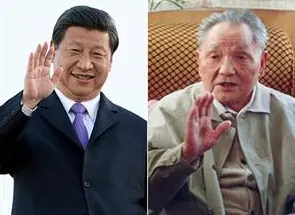President Vladimir Putin said Thursday Russia aspired to be a responsible global leader, while blaming domestic factors for the country's economic slowdown.
SEEKING TO BE GLOBAL LEADER, NOT HEGEMONY
In his annual state-of-the-nation address to the parliament in the Grand Kremlin Palace, Putin said, "We'll try to be leaders, protecting international law, based on respect for national sovereignty of the people."
But Russia would not claim "the title of superpower, understood as global or regional hegemony," he added.
Noting that military, political, economic and informational competition was growing in the world, Putin said Russia had been steadily standing for its values in international relations.
He called Moscow's steps to help settle the Syrian conflict "well-judged and reasonable."
"At least so far, we have managed to avoid foreign military intervention in Syrian affairs and the spread of the conflict beyond the region," Putin said.
He said not once had Russia put either its own interests and security or global security in danger.
"This is the way a mature and responsible power should act," Putin said.
On Iranian nuclear talks, he urged Tehran's right for nuclear energy be secured while providing security for all countries in the region.
"This year, the breakthrough on the Iranian nuclear program has been made and this is only the first step," he said. "It's necessary to keep looking for a wider solution which guarantees Iran's right for peaceful nuclear energy and security of all countries in the region, including Israel."
Putin said the so-called "Iranian threat" was the main excuse the United States offered for deployment of an anti-missile defense shield in Europe.
"Now the Iranian problem has gone but the anti-missile defense stays in place and grows," he said.
According to Putin, the true goals of the missile defense system being built by Western countries did not correspond with its name.
"In fact, it is a significant component of a strategic offensive potential," he said.
Meanwhile, the strongman warned Moscow would not allow anyone to achieve military superiority over it, saying "Russia will respond to any challenges, both political and technological ones."
"Our military doctrine and prospective types of weapons allow us unconditionally to provide security of the country," he said, adding defense spending would reach 23 trillion rubles (about 705 billion U.S. dollars) in the next decade.
SLASHING INTERNAL DEFICIENCY, PUSHING FOR EURASIAN UNION
Commenting on the sluggish economic growth, Putin skipped the global crisis to take a shot at low labor productivity.
"We need to boost domestic demand for high technology, for innovations," he said.
The president demanded balance between industrial growth and environmental protection, and vowed to pursue sustainable economic growth.
The executive branches of power, Putin said, had not taken sufficient measures to implement ideas offered by the presidential decrees issued in May 2012.
"Where are all these measures? Eighteen months have already passed since the decrees were published. Either something is being done to cause a negative response in society, or nothing is being done at all," Putin said.
"We won't definitely achieve the set targets if we continue to work in such a manner. These reforms are taking unacceptably long," he complained.
Meanwhile, he said the goals of Russia's socio-economic development set in the May decrees would not be revised.
"Certainly, economic trends may vary, but there is no reason to talk about revising our goals. We should do real work, look for solutions, and clearly set budgets and other priorities," Putin said.
He said the development of Siberia and the Far East should be a priority for Russia throughout the 21st century.
The goals that have to be attained were "unprecedented in their scope," he said.
Putin also called on the State Duma and the Federal Council, the lower and upper houses of the parliament, to support "in a priority manner" an agreement on the Eurasian Economic Union as soon as the document is submitted.
Noting that preparations for the treaty have entered the decisive phase, Putin said the process involving Kyrgyzstan and Armenia's accession to the Belarusian-Kazakh-Russian Customs Union (CU) is also under way.
"I am sure that real achievements of Eurasian integration will only make it more appealing to our other neighbors, including our Ukrainian partners," he said.
Putin said Russia would consistently promote its Eurasian project without opposing it to other integration projects, including the European Union (EU), which he described as "matured."
 简体中文
简体中文





